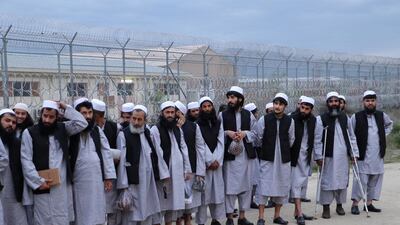Afghanistan's Taliban insurgents have rejected the government's call for a ceasefire during Ramadan, citing delays in the implementation of a peace deal reached with the United States that includes a prisoner exchange.
Afghan President Ashraf Ghani appealed to the militants to lay down their arms for the Islamic holy month that began on Friday, as the country battles a growing coronavirus oubreak.
But the Taliban's spokesman Suhail Shaheen said the the government's offer was irrational.
"Asking for ceasefire is not rational and convincing," he wrote in a tweet late on Thursday, accusing the government of putting prisoners' lives at risk during the outbreak.
The Taliban last observed a ceasefire with the government during the three-day Eid Al Fitr festival following Ramadan in 2018.
Under the US-Taliban deal signed earlier this year, the Afghan government and the insurgents were by now supposed to have concluded a prisoner swap and started talks aimed at bringing about a comprehensive ceasefire.
American and other foreign forces in Afghanistan as part of Nato's US-led Resolute Support Mission, have pledged to quit the country by July 2021 provided the Taliban stick to several security guarantees and hold talks with the government.
The insurgents accuse the government of not abiding by the terms of the prisoner swap, which would see 5,000 Taliban detainees released in exchange for 1,000 government officials, that is a precursor to direct negotiations. Both sides have released only a part of the numbers agreed upon.
The peace efforts have been hampered by a dispute between Mr Ghani and Abdullah Abdullah, his main political rival who has refused to accept the result of the September 2019 presidential election, and the coronavirus outbreak in the country.
Nato on Friday appealed for Afghan leaders to "resolve their differences and form an inclusive government", saying they "must seize this opportunity for peace".
The military alliance also urged the government and the Taliban to accelerate the release of prisoners as a confidence-building measure and to heed international calls for an immediate humanitarian ceasefire, given the threat posed by the spread of the coronavirus.
The current level of violence by the Taliban was "not acceptable", Nato said.
Dozens of Afghan security forces personnel were killed in a fresh wave of violence launched by the insurgents this week.
The attacks have mostly been limited to rural areas and small towns. Under the US-Taliban deal, the insurgents agreed not to attack cities.
Mr Ghani has been calling for a lasting ceasefire with the Taliban for years, only to be ignored by the increasingly emboldened insurgents.
The Taliban instead have mocked his government, referring to them as "puppets" controlled by foreign powers, and have refused to engage in peace talks as they intensify attacks on Afghan forces.

